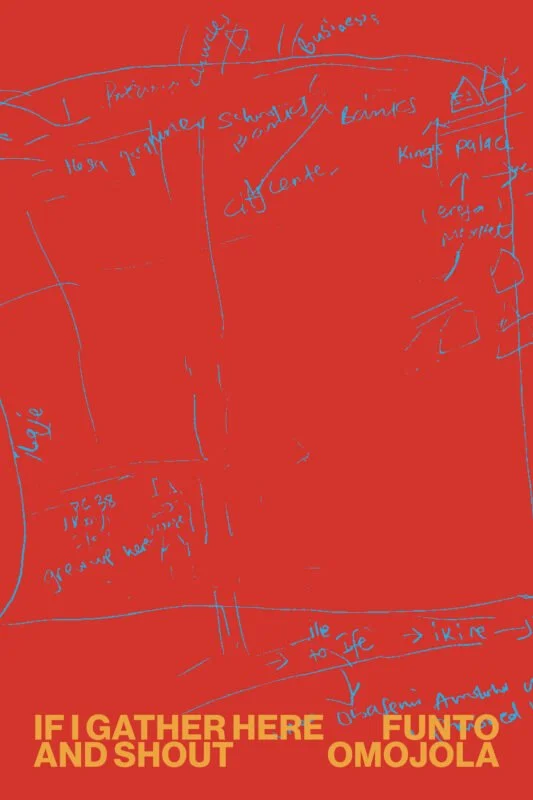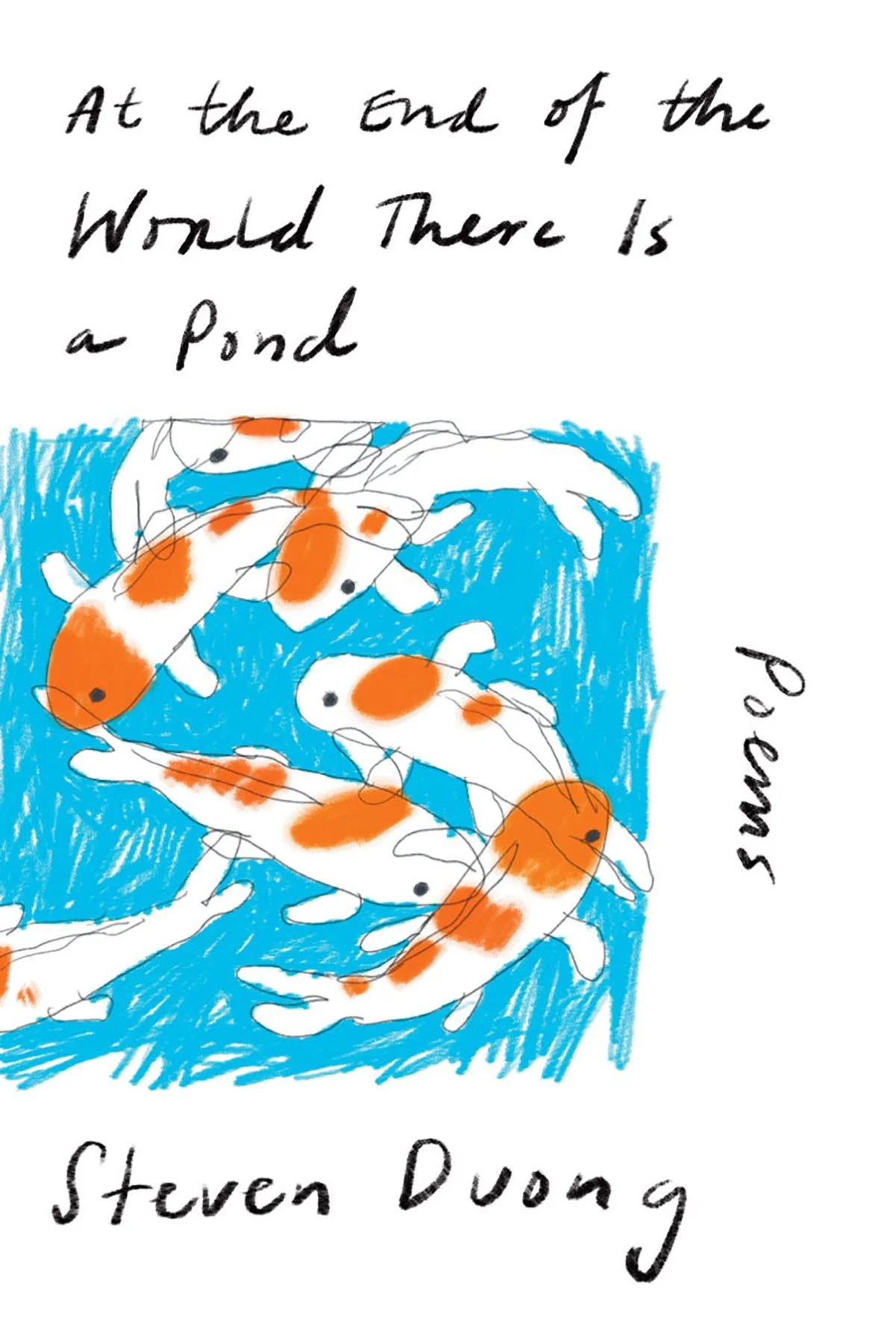8 Winter Poetry Collections That Will Reinvent You
Crafting new worlds out of familiar feelings,
these poets remind us of the antithetical sweetness of existence
by Turi Sioson
Traditionally, winter is a time for rest, for remaining inside and escaping external weather. Or maybe you’re facing it head-on, carrying yourself through the snow and ice no matter how difficult it is. But this season also moves us to remember, reflect, and reinvent. Winter marks a symbolic reset for both nature and society, encouraging us to slow down and take stock. But what if we’re trapped in a whirlwind?
Steven Duong’s At the End of the World There Is a Pond places you right up against the “algae-kissed glass,” challenging us to shift and refocus our attention; in Pádraig Ó Tuama’s Kitchen Hymns, domesticity marries existentialism to charming effect. Maria Zoccola’s Helen of Troy, 1993 — a collection I’ve been looking forward to since reading a handful of the book’s early poems in 2022 — is “a humming that [keeps] its meter and … its rhyme,” transforming a mythical figure into a modern woman of the South.
These 8 new poetry collections blend myth, song, and pain, chronicling the complexities of existing disharmoniously. With a dazzling attention to both the beauty of the world and the destruction that tears us away from watching, you’ll find yourself returning to these books for years to come. Read below to find a new way back to yourself through this winter’s poetry.
Joseph Fasano wonders at the wildness of the world in his newest collection, The Last Song of the World. With steady, lucid attention and a musical touch, he calls in myths that recount our origins to reckon with modern strife and climate disasters that seemingly predict our destruction. Across poems exploring fatherhood, desire, ancient wreckage, and nature, “the immensity, / the great joke of being” emerges from the darkness, leaving a final song of freedom.
“If this / is the world, it is more precious // lessened,” yet Fasano’s collection is brimming with beauty illuminated against the backdrop of ruin, stretching to every corner of experience to reveal our world as a labyrinth. Each individual line is masterful, crafted as an assertion of the multiplicities that consume and confuse us: “Grief may snag its antlers / in your branches / before it leaves you, / before it finds its way,” he writes in “Words to Say When Walking Out the Door.” Fasano’s language is at once easy to read and delightfully challenging, encouraging us to observe and question.
Despite the terror of the world seeming hopeless, “there is no one / you’re betraying / in your changes / when you become the whole wild song of what you are,” he stresses in “After Love.” Though things may be crumbling, The Last Song of the World reminds us that we can always return to music and begin again.
A Kiss for the Absolute
by Shūzō Takiguchi
translated by Mary Jo Bang and Yuki Tanaka
Princeton University Press, Nov. 2024
The poems in A Kiss for the Absolute, the first book of poems by surrealist poet, artist, and art critic Shūzō Takiguchi to be published in English, are of a distinctly joyous, cheeky surrealism. Imagination brings forth pleasure and modern myth, blending the disquiet of the Modernist movement with his Takiguchi’s visions of eros and philosophy. “It’s a youthful adventure,” he declares.
In the Japanese, Takiguchi plays with various scripts, as well as English and French, crafting a vibrant multicultural conversation. Bang and Tanaka bring this discourse into full English with equally delightful wordplay. Across prose poems and those more traditionally structured, a near-contemporary voice radiates the page, announcing this work as more than just literary history. Takiguchi draws Western art and music — especially that of the French — into a playfully twisted exchange, “language [convulsing] the history of several hundred million centuries” and stretching now into the 21st century.
In this splendidly resonating collection, “desire still swims,” “night slips off like a love letter,” and “fossilized water … brightens day by day.” A Kiss for the Absolute will make you wonder how you’ve been living all this time, and how you might now carry yourself with more rapture, more mystery, and more attention fit for the dizzying world we inhabit.
“Men want to make you into rust. / Men want to put things inside you.” The cowboy in Eduardo Martínez-Leyva’s Cowboy Park, winner of The Felix Pollak Prize in Poetry, is not the icon as you know him. These intoxicating poems are lyrical depictions of memory and desire, paving a path to escape the violence and misunderstandings of the past.
Possession, obedience, and eroticism intertwine with teachings on religion and masculinity in astonishing ways. “I mistake the word discipline / for disciple. Same shit. You tell me,” he writes in “Show Pony.” In “Ode to a Leather Harness, he declares, “You are mine. Together we are / a horse-drawn carriage, our very own heaven, / and no prayer stuck in my throat / will make me any sweeter.” For queer Southern readers, Martínez-Leyva’s collection is especially stirring. Reflections of “little town[s] of magnificence” are sprawled across the page with delicious diction and form that Martínez-Leyva employs with clear curiosity and verve.
A collection as tender as it is feverish, Cowboy Park challenges what we believe to be true about identity and pleasure. As you “[let] the full context of it travel / through you,” this debut is sure to leave you gasping for more.
From the body comes bewildering beauty in Funto Omojola’s debut poetry collection, If I Gather Here and Shout. Yoruba rituals and community lineage contrast sharply with Western misunderstandings and medicine, revealing how “ceremony is survival.” The speaker must become “an expert at un burrowing,” carrying their body across time, through a world that seeks to other both their illness and existence.
Lyrical fragments and probing syntax make scientific strangeness of the body familiar, even magical. Poems stretch across the page, horizontally and vertically, imitating the movement or desire for movement that is reflected in the poems’ language itself. There are “[mouths] crowded with begging,” the speaker has “saline leaking out of mouth, / component of a child’s destiny”; visceral images of palms, stomachs, fingers, and throats invoke a shared sense of survival made wondrous via memory and careful attention. “Birth-ing soil unto soil requires a certain amount of dance!” Omojola writes. “How riveting to be premonition-ing the body.”
In If I Gather Here and Shout, “survival is joy,” a frenetic bliss that makes this debut pack an especially smarting punch. Omojola’s collection is not simply a declaration of resistance, but a reconfiguration of our relationship to disability and illness that enchants the body and reintroduces music to our souls thrumming for song.
A simpler existence is mourned in Winter of Worship, Kayleb Rae Candrilli’s fourth collection filled with hometown memories, linguistic reenactments of youth, and queer observations of domestic moments. “What’s done is done, unless you give it a pulse / to breathe with,” they raise in “One Hundred Demons,” which is exactly what Candrilli does across haunting, relief-reaching ghazals, haibuns, and Marble Runs, a form original to the poet.
The whole collection is an elegy of its own, traversing with a stable, vivid voice the futures, friends, and family lost to passing time. Inside these poems is a desire to stop hurting, to slow down climate and societal destruction — Candrilli laments how “about trans bodies / [AI] learns so much faster than family”; a diction of unease and loss populates the book with words like “stuck,” “turbulent,” and “worry.” In “I Wish I Were More Like My Mother” they write, “I would prefer to have remained / my mother’s daughter, too.” Yet they know that escape is necessary: “no / animal lingers while a brush fire / rages.”
In Winter of Worship, Candrilli insists that “not all memories / are painful.” With an emotive command of narrative and form, they emphasize that “in this rough meadow of meantime,” we must lean on each other and move forward. “Let’s just grow again,” they conclude.
Swirling in the waters of Steven Duong’s tender, witty debut collection is a call to view the world from every angle, to see a place “in which / a fruit bat / can, for a split second, swallow a sun.” Awe and affection for our surroundings mix with apocalyptic doom, rendering the everyday violences we shy away from into charming opportunities for connection.
Familial incongruity punctuates the restlessness of external disparities: “Ma & I were yelling / in two different languages & the crying // made use of neither”; fortifying friendships bloom in between laments about how “it’s a fucking chore to live in this nation.” Across pages with deliciously distinct line breaks and musicality, Duong crafts rhythmic, addictive poems that glide as smoothly as a koi fish in a pond. There are equal amounts playfulness and beauty within images that extend beyond their point of origin. “We abandon / the car & bask in the drunk stutter of street- / lamps, deaf to the stars,” he writes in “The Failed Refugee.”
Both a comfort and a confrontation, At the End of the World There Is a Pond challenges us to keep moving intrepidly toward the end, no matter how much we might want to escape contemporary absurdities. “At dawn, the light is yours,” Duong reminds us in “Untogether.” “Even / if you want nothing to do with it.”
In the opening poem of Maria Zoccola’s untethered, bewitching debut collection, she announces, “i want you silent. / i want you listening to me.” From the moment you step into the world of Helen of Troy, 1993, you are made a witness. In a breathtaking set of poems that oscillate between Helen’s perspective and that of a chorus of Spartan women, Zoccola reveals the transformative power of agency and identity.
Helen fits right into the ’90s small town of Sparta, Tennessee, a rebellious housewife grappling with her ill-fitted roles of homemaker and mother. Each poem insists on holding your attention, practically demanding you restart the moment you reach the closing line. In “helen of troy plants near the mailbox,” she writes, “i needed god / to send me the kind of life that would survive my mothering … / … a / cradle dug beyond the killing / lance of my own attention.” Zoccola wastes not a single word or punctuation mark, commanding the line as well as Helen does her story.
With craft and voice worthy of literary obsession, these poems will pierce right through you. “Maybe you have also / felt it building inside you,” Zoccola writes in the contemplative voice of Helen. “A kind of biting / heat, this conviction of your own / consequence.” A fierce reimagining of this long-misunderstood figure of mythology, Helen of Troy, 1993 is a debut you will be unable to forget.
“In a place with no sunrise, I reckon with the empty,” writes Pádraig Ó Tuama in his fourth collection, Kitchen Hymns. From philosophical musings and quiet yet weighty everyday encounters, a secular faith emerges. Transformative snapshots of a life consumed by language and desire reach for us to create and be created.
With an all-knowing yet conversational tone, characteristic of Irish hymns, Ó Tuama’s voice echoes across the pages and into the room you read from. His storytelling charm is a warm shelter from the overwhelm of uncertainty and doubt. Rhymes are domestic and sweet, traditional yet surprising; characters are at once intensely alive and ghostly, reckoning with each other as much as with their own existence. Explorations and their language are accessible but no less challenging, drawing emotion to the surface you didn’t know you had. In “The Book of Revelation,” when the speaker asks a woman what her love language is, she insists: “all of them. And death. Hunger too. And things I don’t have / the words for.”
Both a timely and timeless search for belief, the lyrical Kitchen Hymns encourages us to feel — ourselves, our thoughts, those around us — beyond existential thought. “Are you burning yet?” the speaker asks her “darlings” in “Mother Brendan’s Opening Words at Ash Wednesday Mass.” “You will be.”
Turi Sioson is a queer, Filipina-Italian American poet, editor, and publicist based in Austin, TX. She’s the editor and publicity director at Sunstroke Press and a reader for ONLY POEMS and Abode Press. Her poetry and prose have appeared or are forthcoming in The Hopkins Review, Epiphany, The Texas Review, Sunstroke Magazine, Freshwater Review, and The Luna Collective, among others. She’s worked as a publicity intern at W. W. Norton and will continue her education in publicity at Farrar, Straus and Giroux this fall. She holds a BA in English and Honors Creative Writing Certificate in Poetry from The University of Texas at Austin, and a copyediting certificate from Emerson College.










